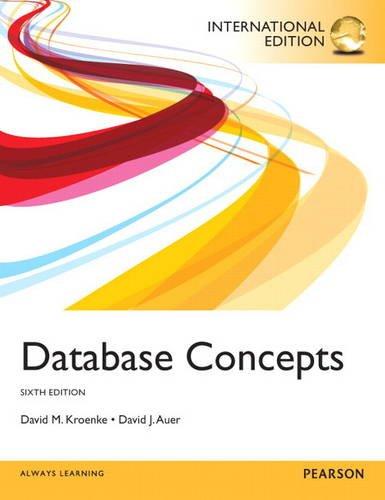Question
Any help would be appreciated(i am using livesql.oracle chapter 4, exercise 2 SELECT CUST_LAST_NAME, CUST_EMAIL, ORDER_ID, SUM(QUANTITY) AS QTY FROM (SELECT CUST_LAST_NAME, CUST_EMAIL, ORDERS.ORDER_ID, PRODUCT_ID,
Any help would be appreciated(i am using livesql.oracle
chapter 4, exercise 2
- SELECT
CUST_LAST_NAME,
CUST_EMAIL,
ORDER_ID,
SUM(QUANTITY) AS QTY
FROM
(SELECT
CUST_LAST_NAME,
CUST_EMAIL,
ORDERS.ORDER_ID,
PRODUCT_ID,
QUANTITY
FROM
OE.CUSTOMERS INNER JOIN OE.ORDERS
ON OE.CUSTOMERS.CUSTOMER_ID = OE.ORDERS.CUSTOMER_ID
INNER JOIN OE.ORDER_ITEMS
ON OE.ORDERS.ORDER_ID = OE.ORDER_ITEMS.ORDER_ID
ORDER BY
ORDER_ID ASC) CTE
4. Back in Chapter 4, exercise 2 you wrote an SQL statement to get some information on customer orders. Convert that query into a common table expression (CTE) named customer_information. Use your newly created CTE as your source table and return the following fields:
-
CUST_LAST_NAME
-
CUST_EMAIL
-
ORDER_ID
-
SUM(QUANTITY) as QTY
Remember to place any fields not part of an aggregate function within the GROUP BY clause.
5. Using the CTE named customer_information that you created for the previous problem (problem 4). Add a correlated subquery that also shows the total value of the order. Using an alias, name this calculated field OrderTotal. Because this is a corelated subquery, it falls into the category of an aggregate and does not need to be included in the GROUP BY clause. (Hint: You will have to correlate between oe.orderse.order_id and customer_information.orderid to get order_total).
Step by Step Solution
There are 3 Steps involved in it
Step: 1

Get Instant Access to Expert-Tailored Solutions
See step-by-step solutions with expert insights and AI powered tools for academic success
Step: 2

Step: 3

Ace Your Homework with AI
Get the answers you need in no time with our AI-driven, step-by-step assistance
Get Started


